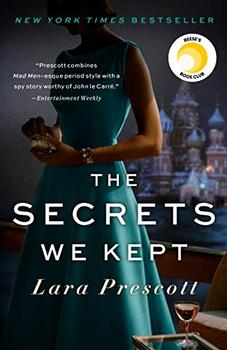Summary | Excerpt | Reading Guide | Reviews | Beyond the Book | Readalikes | Genres & Themes | Author Bio

A novel
by Lara PrescottPrologue
The Typists
We typed a hundred words per minute and never missed a syllable. Our identical desks were each equipped with a mint-shelled Royal Quiet Deluxe typewriter, a black Western Electric rotary phone, and a stack of yellow steno pads. Our fingers flew across the keys. Our clacking was constant. We'd pause only to answer the phone or to take a drag of a cigarette; some of us managed to master both without missing a beat.
The men would arrive around ten. One by one, they'd pull us into their offices. We'd sit in small chairs pushed into the corners while they'd sit behind their large mahogany desks or pace the carpet while speaking to the ceiling. We'd listen. We'd record. We were their audience of one for their memos, reports, write-ups, lunch orders. Sometimes they'd forget we were there and we'd learn much more: who was trying to box out whom, who was making a power play, who was having an affair, who was in and who was out.
Sometimes they'd refer to us not by name but by hair color or body type: Blondie, Red, Tits. We had our secret names for them, too: Grabber, Coffee Breath, Teeth.
They would call us girls, but we were not.
We came to the Agency by way of Radcliffe, Vassar, Smith. We were the first daughters of our families to earn degrees. Some of us spoke Mandarin. Some could fly planes. Some of us could handle a Colt 1873 better than John Wayne. But all we were asked when interviewed was "Can you type?"
It's been said that the typewriter was built for women—that to truly make the keys sing requires the feminine touch, that our narrow fingers are suited for the device, that while men lay claim to cars and bombs and rockets, the typewriter is a machine of our own.
Well, we don't know about all that. But what we will say is that as we typed, our fingers became extensions of our brains, with no delay between the words coming out of their mouths—words they told us not to remember—and our keys slapping ink onto paper. And when you think about it like that, about the mechanics of it all, it's almost poetic. Almost.
But did we aspire to tension headaches and sore wrists and bad posture? Is it what we dreamed of in high school, when studying twice as hard as the boys? Was clerical work what we had in mind when opening the fat manila envelopes containing our college acceptance letters? Or where we thought we'd be headed as we sat in those white wooden chairs on the fifty-yard line, capped and gowned, receiving the rolled parchments that promised we were qualified to do so much more?
Most of us viewed the job in the typing pool as temporary. We wouldn't admit it aloud—not even to each other—but many of us believed it would be a first rung toward achieving what the men got right out of college: positions as officers; our own offices with lamps that gave off a flattering light, plush rugs, wooden desks; our own typists taking down our dictation. We thought of it as a beginning, not an end, despite what we'd been told all our lives.
Other women came to the Agency not to start their careers but to round them out. Leftovers from the OSS, where they'd been legends during the war, they'd become relics relegated to the typing pool or the records department or some desk in some corner with nothing to do.
There was Betty. During the war, she ran black ops, striking blows at opposition morale by planting newspaper articles and dropping propaganda flyers from airplanes. We'd heard she once provided dynamite to a man who blew up a resource train as it passed over a bridge somewhere in Burma. We could never be sure what was true and what wasn't; those old OSS records had a way of disappearing. But what we did know was that at the Agency, Betty sat at a desk along with the rest of us, the Ivy League men who were her peers during the war having become her bosses.
Excerpted from The Secrets We Kept by Lara Prescott. Copyright © 2019 by Lara Prescott. All rights reserved. No part of this excerpt may be reproduced or reprinted without permission in writing from the publisher.
Chance favors only the prepared mind
Click Here to find out who said this, as well as discovering other famous literary quotes!
Your guide toexceptional books
BookBrowse seeks out and recommends the best in contemporary fiction and nonfiction—books that not only engage and entertain but also deepen our understanding of ourselves and the world around us.